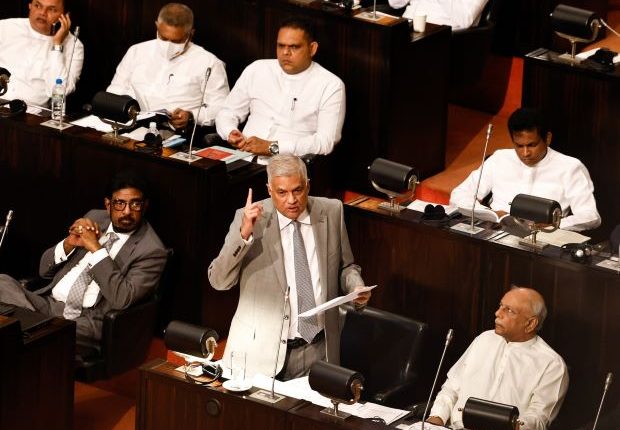Crisis-hit Sri Lanka targets more tax revenue in 2023 budget; concerns on SOEs, spending remain
By Shihar Aneez
COLOMBO – Sri Lanka has aimed at increasing tax revenue by 69% to fund government spending in the crisis-hit economy, but analysts say the 2023 budget failed to address core issues on excess spending and articulate strong policies on restructuring loss-making state owned enterprises (SOEs).
President Ranil Wickremesinghe in his capacity as the finance minister presented the 2023 budget on Monday (14), which he said will lay the foundation for a strong and modern economy that creates opportunities for the island nation’s youth.
The budget has aimed at increasing tax revenue by 69% to 3,130 billion rupees next year from this year’s 1,852 billion rupees, while bringing down the budget deficit to 7.9% in 2023 from this year’s revised 9.8%.
The high tax revenue target comes as millions of Sri Lankans face the impacts of the ongoing economic crisis – 66% inflation, job losses, and shrinking disposable income.
Wickremesinghe in his budget speech announced measures to improve tax administration in a move to broaden the tax net and increase the revenue, though most of the tax hikes including personal income tax were proposed last month.
“While the requirement for everyone over 18 to open a tax file is a first step, many of those who open files will be below the tax-free threshold,” Wickremeinghe said.
“Therefore, it is important to introduce measures that identify high income earners specifically and get them into the tax net.”
Analysts said the budget ended some speculations on increasing taxes further.
“Fears of additional taxes such as wealth tax, increase in VAT (value added tax), additional taxes on revenue etc. came to rest with the announcement of the 2023 budget proposals,” said Danushka Samarasinghe, Chief Executive Officer/Director at Nation Lanka Equities (Pvt) Ltd.
“Ending uncertainty and speculation is a positive. But it would have been better if there were time-bounded targets for increasing government revenue from measures such as divesting state-owned assets and SOEs,” he said.
“Just a mere mention of the intention of divestiture may not hold water. Also any significant reforms to reduce the public sector headcount was the need of the hour and seems to be omitted.”
Wickremesinghe named five SOEs that will be considered for restructuring without any time frame and the proceedings from such a process are expected to boost the foreign currency reserves and a faltering rupee currency.
High Expectations
Markets had been expecting a strong reform-oriented budget from Wickremesinghe, mainly to reduce government expenditure, strong measures to reduce the state sector and minimize corruption, as well as stringent restructuring of SOEs.
However, many analysts said the anticipated strong policy measures were missing from the budget.
“The president should have explained how he plans to restructure bleeding SOEs like the CPC and CEB,” a senior market analyst said referring to state-run fuel retailer Ceylon Petroleum Corporation (CPC) and state-owned Ceylon Electricity Board (CEB).
“These institutions are run at the cost of all other institutions in the country. The restructuring he has suggested has been discussed for the past seven years. There is no timeline for the restructuring he has announced.”
“There are no bold policies. There is no reduction in government expenditure. There is a looming banking sector crisis, but there is no single word about it. There is no solid plan to slim down the state sector. It is only about taxing the same people who have been paying the tax. This budget is off the mark. It lacks vision, courage, and sense of urgency.”
The CPC and CEB are the top loss-making SOEs in the country. The institutions have been bleeding because successive governments failed to set market-based prices for electricity and fuel fearing electoral defeat.
However, the economic crisis following the foreign exchange shortage forced the government to raise the prices of both electricity and fuel to record highs in the second half of this year.
Wickremsinghe, before the budget, had repeatedly spoken about reforms in these two loss-making government’s institutions. However, analysts say, the budget was not as strong as it was expected to be.
Tight rope
Wickresinghe is also under pressure due to a geopolitical cold war between India and China. International powers want Sri Lanka to move away from China while Beijing has been one of the trusted lenders to the island nation.
He needs the support of all the countries if Sri Lanka wants to successfully receive a 2.9 billion US dollar, four-year International Monetary Fund (IMF) loan to instil investor confidence in Sri Lanka.
But more than international pressure, Wickremesinghe is walking a tight rope locally since his appointment as president, as he has to depend on the ruling Sri Lanka Podujana Peremuna (SLPP) lawmakers.
The SLPP had a two-third parliament majority before President Gotabaya Rajapaksa was ousted by protesters who demanded that he resign over his mismanagement of the economy.
Wickremesinghe, who has been in Parliament for 45 years, is the leader of centre-right United National Party (UNP). The UNP has only one seat in the 225-member Parliament.
Political analysts had predicted that Wickremesinghe would be forced to go for only mild changes during the budget because bold measures could be unpopular for the centre-left and nationalist SLPP.
The president needs the support of the SLPP to pass the budget but has to also allow many opposition lawmakers to cross over to the government benches to pass the budget and implement other crucial economic policies.
-economynext.com



Comments are closed, but trackbacks and pingbacks are open.